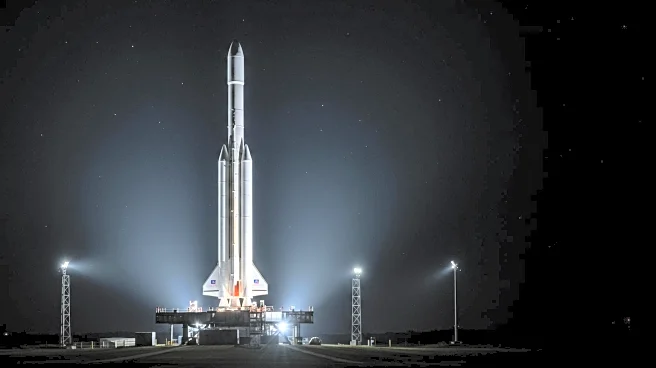What is the story about?
What's Happening?
SpaceX has announced a new test flight for its Starship megarocket, scheduled for August 24 from its Starbase facility in Texas. This follows several previous attempts that ended in explosions, raising concerns about the rocket's reliability. The Starship, touted as the most powerful launch vehicle in history, is central to Elon Musk's vision of returning Americans to the moon and eventually colonizing Mars. Despite setbacks, including a fuel leak and propulsion system failure during past tests, SpaceX remains committed to its 'fail fast, learn fast' approach, which has been instrumental in its commercial spaceflight success.
Why It's Important?
The successful development of the Starship rocket is crucial for SpaceX's long-term goals, including lunar missions and Mars colonization. The repeated failures have put pressure on the company to demonstrate the rocket's viability, impacting its reputation and future contracts. Additionally, the environmental and safety concerns raised by Mexican President Claudia Sheinbaum highlight the broader implications of SpaceX's activities on local communities and ecosystems. The outcome of the upcoming test could influence regulatory decisions and public perception of SpaceX's operations.
What's Next?
SpaceX plans to conduct more Starship tests in the coming months, following approval from the US aviation regulator to increase its annual launches from five to 25. The company aims to launch its first uncrewed missions to Mars next year, contingent on successful test flights. Stakeholders, including environmental groups and local governments, are likely to monitor these developments closely, potentially influencing future regulatory and legal actions.
Beyond the Headlines
The challenges faced by SpaceX in developing the Starship rocket underscore the complexities of advancing space technology. The 'fail fast, learn fast' strategy, while effective in some contexts, raises ethical questions about risk management and accountability, especially when human lives and environmental impacts are at stake. The ongoing tests may also drive innovation in aerospace engineering, potentially setting new standards for reusable launch vehicles.















